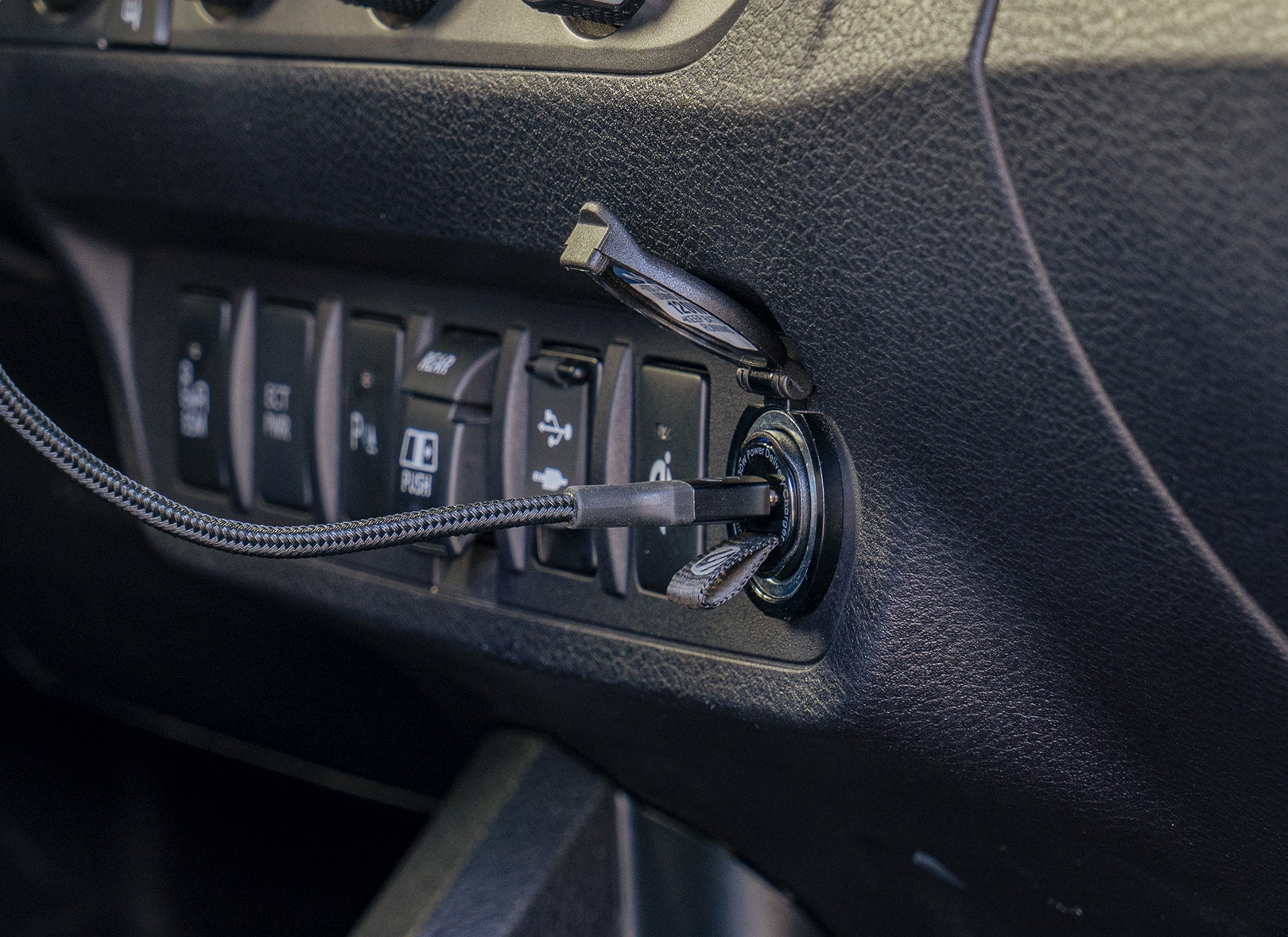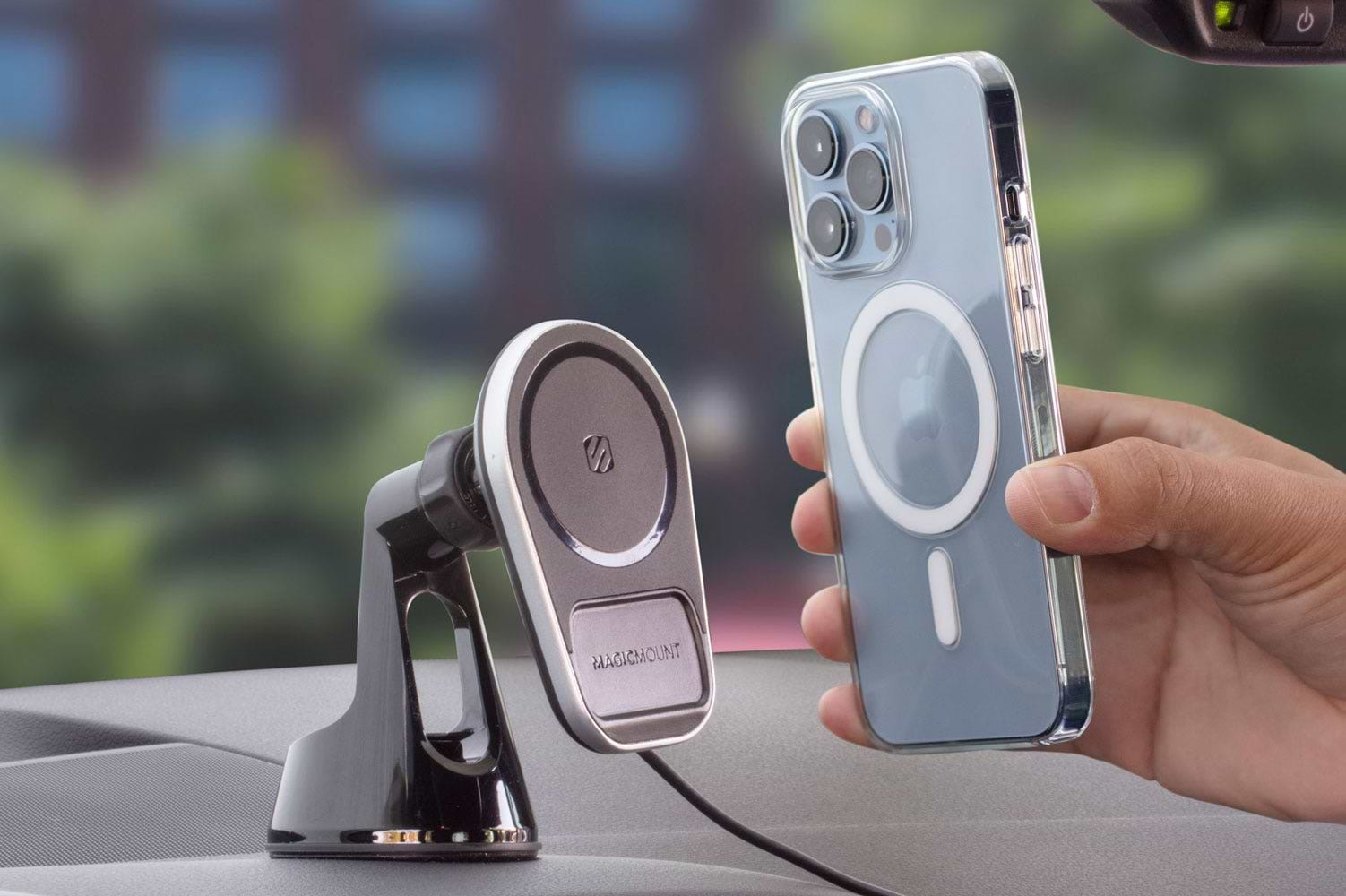Phone Charging in the Car: Tips & Best Practices

In today's fast-paced world, staying connected is essential. Whether you're on a long road trip or simply running errands, having a charged phone is crucial for communication, navigation, and entertainment purposes. However, charging your phone in the car is not as simple as just plugging it in. To ensure optimal charging efficiency and safety, there are a few tips and best practices you should keep in mind.
In this article, we will explore the basics of car phone charging, the do's and don'ts, how to maximize charging efficiency, safety measures, and choosing the right car phone charger.
Understanding the Basics of Car Phone Charging
At its core, car phone charging is a process that involves converting the vehicle's electrical power into a form that can charge your phone battery. To comprehend the science behind it, let's delve into the fundamental concepts.
When you plug your phone into a car charger, it's not as simple as just connecting two wires. The main component responsible for charging your phone in the car is the car charger, also known as a cigarette lighter adapter. It utilizes the vehicle's DC (direct current) electrical system and steps down the voltage to match your phone's charging requirements. This process involves a regulator circuit that converts the higher voltage of the car battery to a lower voltage suitable for charging your phone.
The car charger acts as a bridge between the car's electrical system and your phone. It ensures that the power flowing from the car's battery is transformed into a form that your phone can safely accept. Without this conversion, the high voltage from the car's battery could potentially damage your phone's delicate circuitry.
The Science Behind Car Phone Chargers
Now, let's dive deeper into the science behind car phone chargers. The car charger consists of various components that work together to ensure a smooth and efficient charging process.
One of the key components is the voltage regulator. This small electronic device is responsible for maintaining a constant voltage output, regardless of fluctuations in the car's electrical system. It ensures that your phone receives a steady and reliable flow of power, preventing any potential damage caused by voltage spikes or drops.
In addition to the voltage regulator, car chargers also incorporate a current limiter. This component controls the amount of current flowing from the car's battery to your phone. By limiting the current, it prevents any excessive heat buildup that could harm your phone's battery or other internal components.
Furthermore, car chargers often feature built-in safety mechanisms such as overcurrent protection and short-circuit protection. These safety features are designed to automatically shut off the charging process if any abnormal conditions are detected. This helps to safeguard your phone and prevent any potential hazards.
Types of Car Phone Chargers
Now that we understand the science behind car phone chargers, let's explore the different types available on the market.
USB chargers are the most common type of car phone chargers. They utilize a USB port to connect to your phone and draw power from the car's electrical system. USB chargers are versatile and compatible with a wide range of devices, making them a popular choice among users.
Wireless chargers, on the other hand, offer a convenient and cable-free charging experience. These chargers use electromagnetic fields to transfer energy to your phone without the need for a physical connection. Simply place your phone on the wireless charging pad, and it will start charging automatically. This technology is becoming increasingly popular, as it eliminates the hassle of dealing with tangled cables.
For those who are always on the go and need their phone charged quickly, fast chargers are the ideal choice. These chargers are designed to deliver a higher current, enabling faster charging times compared to conventional chargers. With a fast charger, you can significantly reduce the time it takes to charge your phone, allowing you to stay connected and powered up even during short car rides.
Whether you opt for a USB charger, wireless charger, or fast charger, it's important to choose a high-quality charger from a reputable brand. This ensures that your phone is charged safely and efficiently, without any risk of damage to your device or the car's electrical system.


The Do's and Don'ts of Car Phone Charging
While charging your phone in the car may seem straightforward, there are some important do's and don'ts that you should be aware of. Adhering to these guidelines will not only ensure proper usage but also prevent any potential mishaps.
Proper Usage of Car Phone Chargers
When using a car phone charger, always ensure that the charger is compatible with your phone's charging requirements. It is recommended to use the charger provided by the phone manufacturer or a reputable third-party charger. Using a charger that is not compatible with your phone can result in slow charging or even damage to your phone's battery.
Additionally, make sure the charger is securely connected to both the car's power outlet and your phone. A loose connection can lead to intermittent charging or no charging at all. It's also important to check the charging cable for any signs of damage or fraying. Using damaged cables can pose a risk of electric shock or fire. If you notice any damage, it's best to replace the cable with a new one.
Furthermore, it's a good practice to place your phone in a secure location while it's charging in the car. Avoid placing it on the dashboard or any other area where it can easily fall or get damaged. Consider using a phone mount or a designated phone holder to keep it safe and stable.
Common Mistakes to Avoid
One common mistake is leaving your phone connected to the car charger even when it's fully charged. This can lead to overcharging and may potentially shorten your battery's lifespan. Overcharging can cause the battery to heat up, which can degrade its capacity over time.
To prevent overcharging, it's recommended to unplug your phone once it reaches 100% charge.
It's also important to avoid charging your phone in extreme temperatures, as high heat or cold can affect the battery's performance. Exposing your phone to extreme heat, such as leaving it in direct sunlight, can cause the battery to overheat and potentially damage it. On the other hand, extreme cold temperatures can cause the battery to drain faster. If you're in a hot or cold environment, it's best to wait until the temperature is within the recommended range before charging your phone.
Lastly, refrain from using your phone excessively or running power-intensive applications while it's charging in the car, as this can generate excessive heat and strain the battery. Power-intensive activities like gaming or using GPS navigation can cause the phone to heat up, especially when charging. To ensure optimal charging and prevent overheating, it's advisable to limit the usage of power-intensive applications while your phone is connected to the car charger.
By following these do's and don'ts of car phone charging, you can ensure the longevity of your phone's battery and minimize the risk of any charging-related issues. Remember to always prioritize safety and use reliable charging accessories to keep your phone powered up on the go.
Maximizing Your Car's Charging Efficiency
When it comes to charging your phone in the car, you want to ensure maximum efficiency and minimize charging time. Here are some tips to help you achieve just that.
Did you know that the charging efficiency of your phone can be affected by various factors? It's not just about plugging in your charger and waiting for your phone to charge. By following these tips, you can optimize your charging experience and make the most out of your car charger.
Tips for Faster Charging
Close any unnecessary apps or processes running on your phone to reduce power consumption while charging. When your phone is running multiple apps in the background, it requires more power, which can slow down the charging process. By closing these apps, you allow your phone to focus solely on charging, resulting in faster charging times.
Another tip is to enable airplane mode or turn off data and Wi-Fi connections while charging. When your phone is constantly searching for a signal or connected to the internet, it consumes more battery power. By disabling these features, you reduce battery usage and allow your phone to charge more efficiently.
Consider using a fast charger that is compatible with your phone to take advantage of quicker charging times. Fast chargers are designed to deliver a higher current to your phone, allowing it to charge at a faster rate. However, it's important to ensure that the fast charger you use is compatible with your phone to avoid any potential damage.
Maintaining Your Car Charger for Optimal Performance
Regularly inspect your car charger for any signs of damage or wear and tear. Over time, car chargers can become damaged or develop faults that can affect their performance. If you notice any frayed cables, loose connections, or other signs of damage, it's important to replace your charger to prevent any potential issues.
Keep the charger clean and free from debris that could interfere with the connection. Dust, dirt, and other particles can accumulate on the charger's connectors, affecting the charging efficiency. Regularly clean your charger using a soft cloth or compressed air to remove any debris and ensure a proper connection.
Store the charger in a cool, dry place to prevent exposure to extreme temperatures or moisture. Excessive heat or moisture can damage the charger and reduce its lifespan. Avoid leaving your charger in direct sunlight or in areas with high humidity to maintain its optimal performance.
By following these tips and taking care of your car charger, you can maximize your phone's charging efficiency and minimize charging time. Remember, a well-maintained charger and a few simple adjustments can make a significant difference in how quickly your phone charges, allowing you to stay connected and powered up on the go.
Safety Measures for Car Phone Charging
While car phone charging is generally safe, it's important to be aware of potential risks and take appropriate safety measures.
Overheating Issues and How to Prevent Them
Overheating is a common concern when charging electronics in confined spaces like a car. To avoid overheating your phone or charger, ensure adequate ventilation around the charging area. Avoid covering the phone or charger with fabrics or other materials that could restrict airflow.
Safe Handling of Car Phone Chargers
When handling car phone chargers, refrain from using them while your hands are wet to prevent electrical shock. Additionally, avoid inserting any foreign objects into the charging port, as this can damage both the charger and your phone.
Choosing the Right Car Phone Charger
With numerous options available, choosing the right car phone charger can be overwhelming. To make an informed decision, consider the following factors:
Factors to Consider When Buying a Car Charger
- Compatibility: Ensure that the charger is compatible with your phone's charging requirements, including voltage and connector type.
- Power Output: Look for chargers with sufficient power output to meet your charging needs. Higher amperage chargers can provide faster charging.
- Quality and Safety Certifications: Opt for chargers that are certified by reputable organizations to ensure quality and safety standards are met.
When buying a car phone charger, research customer reviews and ratings to ensure you make the best choice for your specific needs.
Conclusion
In conclusion, charging your phone in the car requires some attention to detail and adherence to best practices. By understanding the basics of car phone charging, following the do's and don'ts, maximizing charging efficiency, prioritizing safety, and choosing the right car phone charger, you can ensure a reliable and safe charging experience on the go.